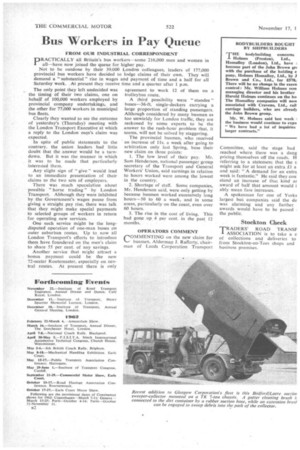Bus Workers in Pay Queue
Page 36

If you've noticed an error in this article please click here to report it so we can fix it.
FROM OUR INDUSTRIAL CORRESPONDENT
PRACTICALLY all Britain's bus workers—some 216,000 men and women in all—have now joined the queue for higher pay. Not to be outdone by their 39,000 London colleagues, leaders of 177,000 provincial bus workers have decided to lodge claims of their own. They will demand a " substantial " rise in wages and payment of time and a half for all Saturday work. At present they receive time and a quarter after I p.m.
The only point they left undecided was the timing of their two claims, one on behalf of 100,000 workers employed by provincial company undertakings, and the other for 77,000 workers in municipal bus fleets.
Clearly they wanted to see the outcome of yesterday's (Thursday) meeting with the London Transport Executive at which a reply to the London men's claim was expected.
In spite of public statements to the contrary, the union leaders had little doubt that the answer would be a turndown. But it was the manner in which it was to be made that particularly interested them.
Any slight sign of " give " would lead to an immediate presentation of their claims to the two sets of employers.
There was much speculation about possible "horse trading" by London Transport. Although they were inhibited by the Government's wages pause from giving a straight pay rise, there was talk that they might make special payments to selected groups of workers in return for operating new services.
One such service might be the longdisputed operation of one-man buses on outer suburban routes. Up to now all London Transport's efforts to introduce them have foundered on the men's claim to share 55 per cent. of any savings.
Another service that might attract a bonus payment could be the new 72-seater Routemaster, especially on central routes. At present there is only agreement to work 12 of them on a trolleybus route.
A third possibility were " standee " buses-36-ft. single-deckers carrying a large proportion of standing passensers. Although considered by many busmen as too unwieldy for London traffic, they are reckoned by some experts to be the answer to the rush-hour problem that, it seems, will not be solved by staggering.
The provincial busmen, who received an increase of I Is. a week after going to arbitration only last Spring, base their new claim on three points: 1. The low level of their pay. Mr. Sam Henderson, national passenger group secretary of the Transport and General Workers' Union, said earnings in relation to hours worked were among the lowest in the country.
2. Shortage of staff. Some companies, Mr. Henderson said, were only getting by because busmen worked excessively long hours—,50 to 60 a week, and in some areas, particularly on the coast, even over 60 hours.
3. The rise in the cost of living. This had gone up 4 per cent, in the past 12 months.
OPERATORS COMMENT COMMENTING on the new claim for busmen, Alderman J. Rafferty, chairman of Leeds Corporation Transport
Committee, said the stage had reached where there was a dang pricing themselves off the roads. H referring to a statement that the u might ask for at least an extra £1 a and said: "A demand for an extra week is fantastic." He said they cou stand an increase of that kind at award of half that amount would i ably mean fare increases.
A spokesman for one of Yorks largest huS companies said the de was alarming and any further awards would have to be passed the public.
Stoe,kton Check
TRADERS' ROAD TRANSP ASSOCIATION is to take a c of collections and deliveries to from Stockton-on-Tees shops and business premises.




















































































































